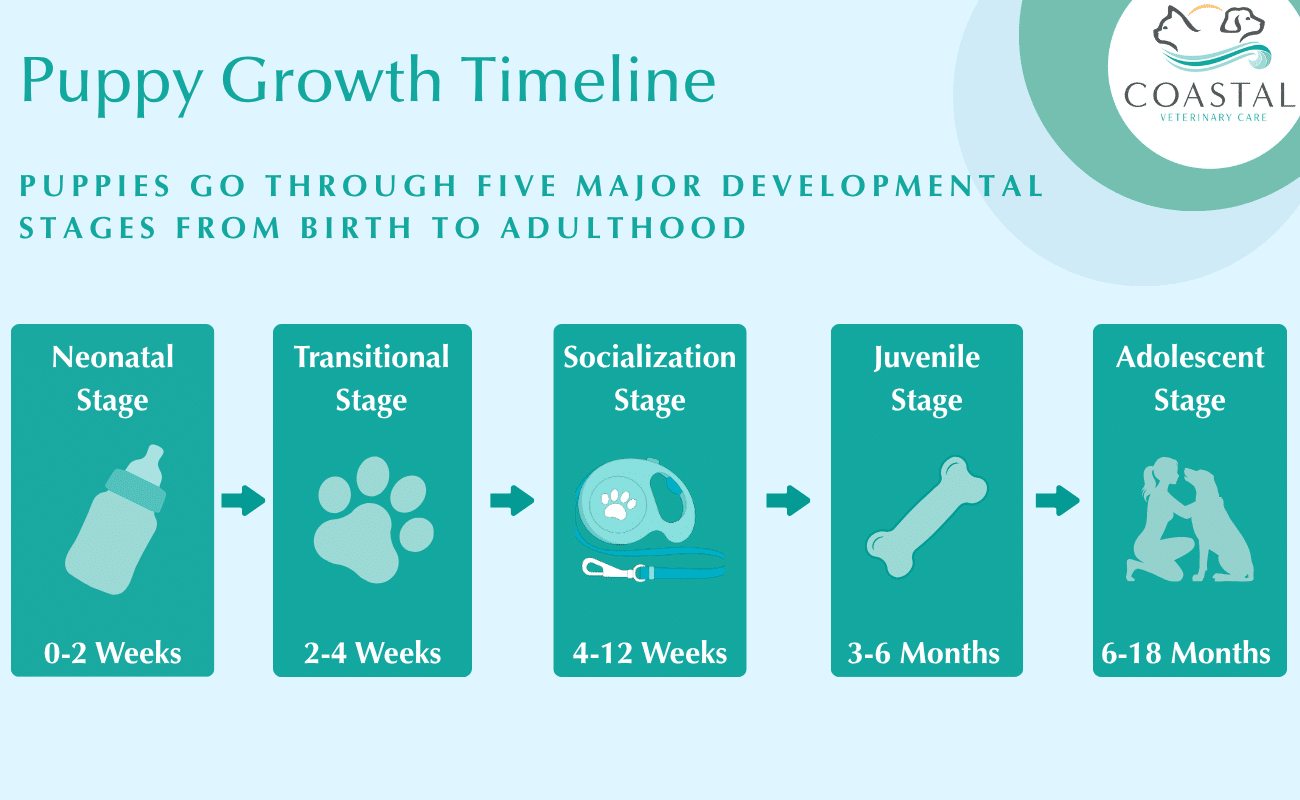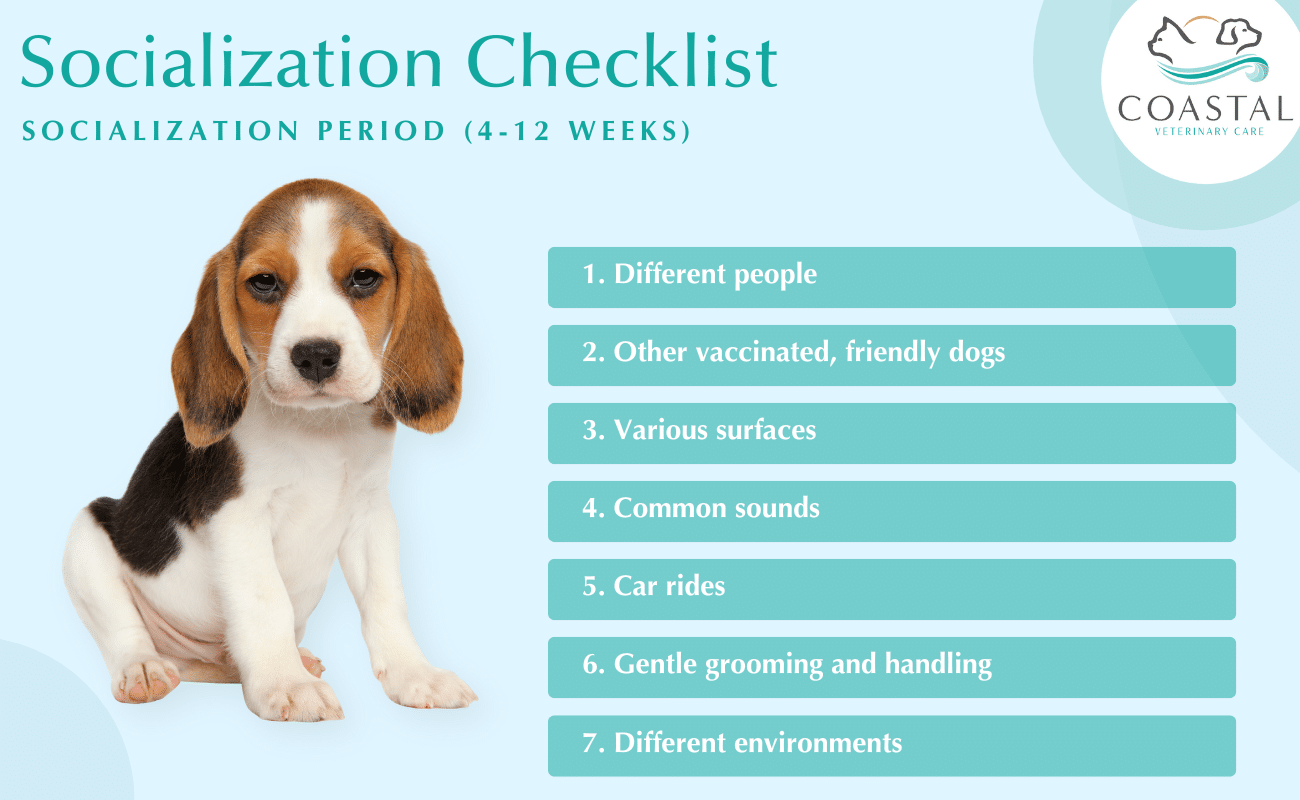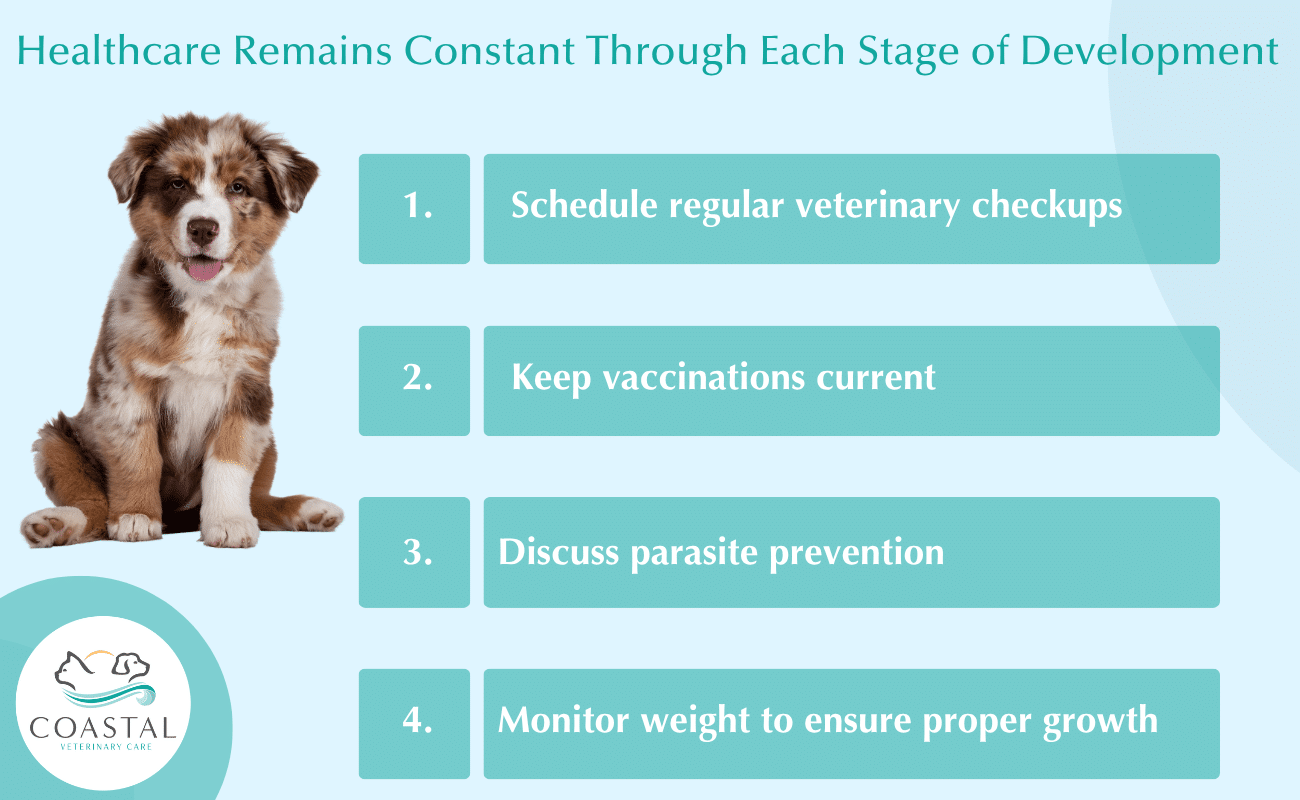Puppy Stages Milestones: What to Expect
The Short Answer: Puppies go through five major developmental stages from birth to adulthood:
- Neonatal
- Transitional
- Socialization
- Juvenile
- Adolescent
Each of these stages holds its own distinct physical changes and behavioral milestones. Understanding these puppy stages helps you provide appropriate care, training, and socialization at the perfect time for healthy brain development and social skills.
Bringing home a new puppy is an exciting journey, but it can also feel overwhelming when you’re unsure what to expect. Every pup develops through predictable life stages, each bringing new behaviors, physical changes, and training opportunities. By understanding what happens during each puppy development stage, you’ll be better prepared to support your furry friend’s growth and address challenges before they become problems. Whether you’re welcoming a newborn pup into your breeding program or adopting a young puppy, knowing these milestones helps you become the best puppy parent possible.

Neonatal Stage (0-2 Weeks)
The neonatal stage begins at birth and lasts about two weeks. During this time, your newborn puppy is completely dependent on their mother.
What’s Happening
Newborn puppies can’t see, hear, or regulate their own body temperature. They spend nearly all their time sleeping and nursing, relying on mom to stimulate elimination and keep them warm. A newborn puppy’s eyes and ears remain closed, and they navigate primarily through smell and touch to find their mother and litter mates.
What to Do
- Monitor weight gain daily (puppies should gain 5-10% of body weight per day)
- Ensure the whelping area stays between 85-90°F for the first week
- Watch for signs that puppies are nursing adequately
- Keep the environment quiet and stress-free for mom and pups
Transitional Stage (2-4 Weeks)
The transitional stage marks major sensory developments. This short but significant developmental stage is when puppies begin interacting with their world.
Physical Milestones
Around 10-14 days, your puppy’s eyes will open, though vision remains blurry for several more days. Ears open around two weeks, and puppies start responding to sounds. Baby teeth begin emerging around three weeks, which coincides with the introduction of solid food.
Behavioral Changes
Puppies become more mobile during this stage, attempting to stand and walk. They start playing with litter mates and exploring their immediate surroundings. This is also when they begin eliminating on their own without stimulation from their mother.
What to Do
- Introduce gentle handling to help with socialization
- Begin offering softened puppy food mixed with formula around 3-4 weeks
- Provide a safe, confined area for exploration
- Start exposing puppies to mild household sounds
Socialization Period (4-12 Weeks)
The socialization period is arguably the most important puppy stage for long-term behavioral health. What your pup experiences during this window significantly impacts their adult personality and confidence.
Why This Stage Matters
Between 4 and 12 weeks, puppies are primed to accept new experiences without fear. Positive experiences during this time help prevent anxiety and behavioral issues later. Conversely, negative experiences or lack of exposure can lead to fearfulness and aggression in adult dogs.
Physical Development
- Puppy teeth continue coming in (complete by 6-8 weeks)
- Coordination improves rapidly
- Puppies can control elimination and begin potty training around 7-8 weeks
- Smaller breeds may develop faster than large breeds
Social Learning
This is when puppies learn bite inhibition from their mother and littermates. When a puppy bites too hard during play, their siblings yelp and stop playing, teaching them to control their mouth pressure. This lesson is one reason puppies benefit from staying with their litter until at least 8 weeks old.
Socialization Checklist
Expose your young puppy to:
- Different people (various ages, appearances, and voices)
- Other vaccinated, friendly dogs
- Various surfaces (grass, tile, carpet, gravel)
- Common sounds (vacuum cleaner, doorbell, traffic, appliances)
- Car rides
- Gentle grooming and handling (touching paws, ears, mouth)
- Different environments (friends’ homes, outdoor spaces, parking lots)

Training Opportunities
Start teaching basic commands using positive reinforcement. Short, fun training sessions work best for puppies with developing attention spans. Focus on:
- Name recognition
- Sit and down
- Coming when called
- Walking on a leash
- Potty training using consistent schedules and rewards
Always use positive reinforcement methods. Reward good behavior immediately with treats, praise, or play. Avoid punishment, which can damage your bond and create fear.
Juvenile Stage (3-6 Months)
The juvenile stage is when your puppy really starts looking and acting more like a dog. This developmental stage brings continued learning and physical growth.
Physical Changes
One of the most noticeable changes is teething. Puppies begin losing baby teeth around 3-4 months, with adult teeth fully in by 6-7 months. This process can be uncomfortable, leading to increased chewing behavior.
During this stage:
- Growth accelerates, especially in large breeds
- Coordination continues improving
- Energy levels increase significantly
- Puppy food remains important for proper nutrition
Managing Teething
Provide appropriate chew toys to soothe sore gums and prevent destructive chewing on inappropriate objects. Good options include:
- Rubber toys designed for teething
- Frozen washcloths
- Puppy-safe chew bones
- Ice cubes or frozen treats
Redirect your pup whenever they chew furniture, shoes, or other household items. Keep tempting objects out of reach and puppy-proof your home.
Continued Training
Your puppy’s attention span lengthens during this stage, making it the perfect time to expand training. Enroll in puppy classes where your pup can practice social skills with new dogs in a controlled environment. Continue reinforcing basic commands and introduce new ones as your pup masters the fundamentals.
Behavior to Watch
Some puppies begin testing boundaries during this stage. Stay consistent with rules and expectations. If you don’t want your adult dog on the furniture, don’t allow your puppy up now.
Adolescent Stage (6-18 Months)
Welcome to the teenage years. The adolescent stage can be challenging as your pup experiences hormonal changes and continued brain development. The duration varies by breed, with smaller breeds reaching maturity faster than large breeds.
Sexual Maturity
Most puppies reach sexual maturity between 6-12 months, though they’re not fully mature physically or mentally. Female dogs typically have their first heat cycle during this time, while male dogs show increased marking and mounting behaviors. Discuss spaying or neutering with your veterinarian during this stage.
Behavioral Challenges
The adolescent stage often brings:
- Increased independence and selective hearing
- Testing of previously learned commands
- Heightened reactivity to new situations
- Possible fear periods where your pup suddenly seems nervous
- Increased energy requires more exercise
Brachycephalic breeds, such as French Bulldogs, may show unique challenges during this stage, including exercise limitations due to their anatomy. Always monitor these breeds carefully during physical activity.
Training Through Adolescence
Don’t abandon training because your puppy “should know better by now.” Brain development continues throughout this stage, and consistency remains important. Your old puppy needs:
- Regular practice of basic commands
- Continued exposure to new things and environments
- Clear, consistent boundaries
- Plenty of physical and mental exercise
- Patience as they work through this challenging phase
Physical Development
Growth continues, though at a slower rate than earlier stages. Large breeds may not reach full size until 18-24 months. Your veterinarian can advise when to transition from puppy food to adult dog food based on your pup’s breed and size.
Breed Differences in Development
Different breeds mature at different rates. Here’s what to expect:
Smaller Breeds: Toy and small breeds typically reach physical maturity by 9-12 months. They move through developmental stages faster and may be ready for adult dog food earlier.
Large Breeds: Giant and large breed dogs continue growing until 18-24 months. Their extended growth period requires longer use of puppy food formulated for their specific needs. Rapid growth in these breeds requires careful nutrition management to prevent joint problems.
French Bulldog and Similar Breeds: Brachycephalic breeds have unique considerations including heat sensitivity, exercise limitations, and potential breathing challenges that become more apparent as they grow.
Setting Your Puppy Up for Success
Throughout all different stages of development, certain principles remain constant:
Health Care
- Schedule regular veterinary checkups to monitor growth and development
- Keep vaccinations current for disease prevention
- Discuss parasite prevention appropriate for your area
- Monitor weight to ensure proper growth rates

Consistency
Puppies thrive on routine. Consistent feeding times, potty breaks, training sessions, and bedtime help your pup feel secure and make learning easier.
Patience
Every puppy develops at their own pace. Some master potty training quickly while others take longer. Some puppies are naturally confident, while others need more encouragement with new experiences. Celebrate progress rather than comparing your pup to others.
Proper Nutrition
Feed high-quality puppy food appropriate for your dog’s expected adult size. Growing puppies have different nutritional needs than adult dogs, requiring higher protein and specific calcium-to-phosphorus ratios for healthy development.
Your Puppy Journey Ahead with Coastal Veterinary Care
Understanding puppy stages helps you anticipate your pup’s needs and provide appropriate care at each developmental stage. From the helpless neonatal stage through the challenging teenage years, each phase brings opportunities to build a strong foundation for your adult dog’s behavior and health. Remember that patience, consistency, and positive reinforcement are your best tools throughout this journey.
At Coastal Veterinary Care in Myrtle Beach, our compassionate team is here to support you and your new puppy through every stage of development. We provide puppy wellness exams, vaccination schedules, nutritional guidance, and behavioral advice tailored to your pup’s specific needs.
Schedule your puppy’s first appointment with us today. Together, we’ll ensure your furry family member grows into a healthy, well-adjusted adult dog you’ll enjoy for years to come.
